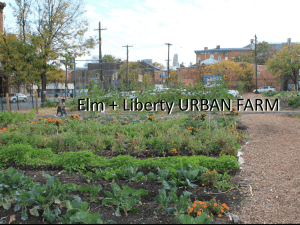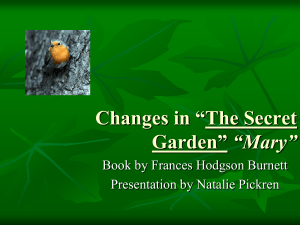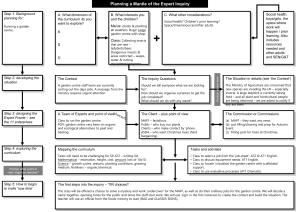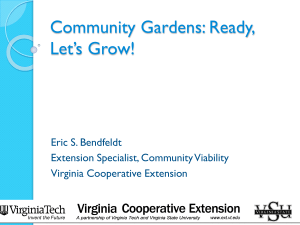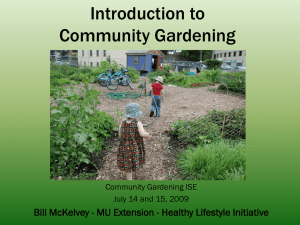PowerPoint - California State University, Fresno
advertisement
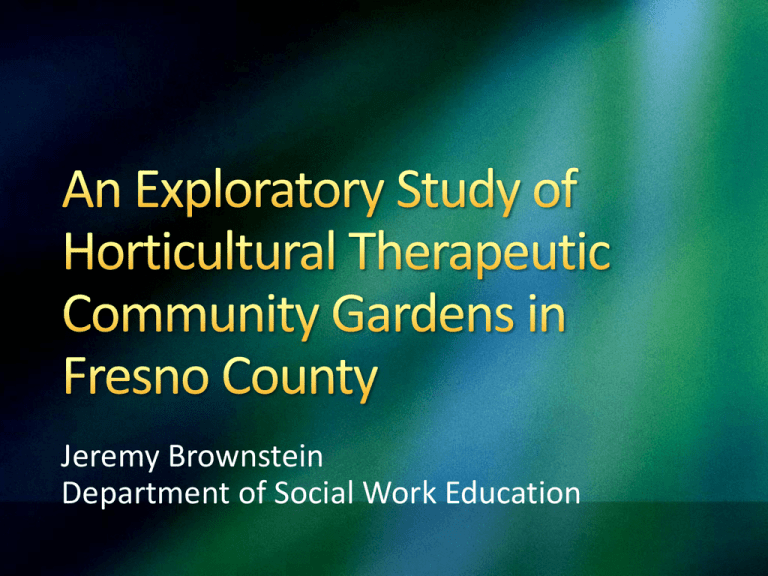
Jeremy Brownstein Department of Social Work Education Contract approved in March 2011 Funded by MHSA; Prevention and Early Intervention (PEI) component 8 garden sites under three contracted providers Target groups: refugee and immigrant populations Southeast Asian, Native American, Mexican American, African American, Eastern European, and Punjabi communities Focused on prevention and addressing the early onset of mental health issues Non-traditional means of service delivery Opportunities to clients Harvest a piece of land Access to a natural space Food Social interactions Meeting place for community members Platform for discussion on mental health wellness and education Outcomes General Close ended Limitation for expansion Potential loss of funding Few studies that support gardens in such a capacity Healing Gardens In Mesopotamia, dating as far back as 2000 B.C., lush agricultural plots that lay in the fertile river valleys provided inspiration for the first designed gardens in this otherwise very arid landscape * Across cultures, nature has traditionally held an important role in health, vitality, and spirituality • *Jellicoe, G. & Jellicoe, S.(1995). Landscape of man (2nd ed.). London: Thames and Hudson, 1995 Europe around the Middle Ages, developed gardens and courtyards at hospitals and monasteries for the sick and insane which served as places for reflection, growing food and herbs for consumption and medicinal use, and growing flowers for use in ceremonies * * Tyson, Martha M. (1998). The Healing Landscape: Therapeutic Outdoor Environments. New York: McGraw-Hill. In 1812 Dr. Benjamin Rush, known for his role in the development of modern psychiatry and a founding father of the United States, published a book titled, “Medical Inquiries and Observations Upon Diseases of the Mind” * Rush stated that “digging in a garden” was one of the activities that distinguished those male patients who recovered from their mania from those who did not First instance of nature assisted therapy in psychology *Rush, B. (1812). Medical inquiries and observations upon diseases of the mind. Philadelphia: Kimber & Richardson. Retrieved September 22, 2013 from http://deila.dickinson.edu/theirownwords/title/0034.htm Roger Ulrich Stress Reduction Theory Rachel and Stephen Kaplan Attention Restoration Theory Roger Ulrich in his paper “Visual Landscapes and psychological well-being” noted that urban scenes tended to bring about fear and sadness, where nature landscapes elicited friendliness, playfulness and elation * Development of the Psychological Stress Reduction Theory Individuals are predisposed to find non-threatening interactions with natural stimuli relaxing and that exposure has a substantial impact upon the parasympathetic nervous system, which contributes to feelings of relaxation and enhanced wellbeing * Ulrich, Roger. (1979). Visual Landscapes and Psychological Well-being “View through a window may influence recovery from surgery” study Foundational in that it showed a connection to the restorative ability of nature, even when individuals are not in direct contact with the environment Rachel and Stephen Kaplan Environmental Psychologists Attention Restoration Theory * Asserts that individuals who spend more time in nature will have better cognitive functioning * Kaplan, R., & Kaplan, S. (1989). The experience of nature: A psychological perspective. New York: Cambridge University Press. Clatworthy (2012) explored the relationship between suburban allotment gardening and wellbeing by utilizing an Interpretative Phenomenological Analysis (IPA) approach with six gardeners, found seven main themes emerge: fundamental importance of food, protection and safety, feeling connected, esteem, pleasure of being in nature, development and values. Exploratory Study How do clients describe their lived experience as a participant in a horticultural therapeutic community center garden? In what ways do clients believe their participation has affected them? Utilizing a phenomenological approach Focused on the lived experiences of individuals in order to develop a lived and existential meaning from their experiences Structured interview instrument (24 questions) Method Flyers distributed at each site Volunteer participation Translators 8 interviews collected Analysis Verbatim transcription Significant statements Themes Explain experiences Three themes were identified amongst responses regarding participant experiences in their garden Socialization Purpose Mental and Physical Wellness Participants reported feeling isolated prior to becoming involved in a garden The garden has been a way to connect and socialize with others “before gardening at home I was aggravated and made me angry at little things, but here when we socialize it helps to relax, keeps me happy with talking with other people it helps my mind. ” “It’s good that I know that there is people out there who are like me...” “I left all my families back in Laos, I come here just myself. The garden help me to everyday life and just with the garden see friends. ” The need to care for the garden Provide food for themselves and families “It contributes back to me that I’m getting something to contribute to my family” “It’s a self-help process for me, in the morning I wake up, I have purpose, what I need to do today if I plant something it looks like they’re calling me, the plant is calling me to come today, I have to go” “so garden it motivates me, made me working hard, keeps me moving ” Participants stated they believe the garden has enhanced their mental and physical health Opportunity for exercise “I have gained physical strength...also helping my mobility, which is my arm and body, and working in the garden” Stress relief “I used to cry and also cry a lot, but when I tend in the garden my distress and everything that I have is release, to see the garden and working at it, it just disappears” “I feel like my emotional is stable now. My immune system has changed, I feel more normal than living in the chronic illness (depression)” “It keeps me fresh and it keeps me healthy” Participants demonstrated with multiple statements the importance of having access to the garden Concerned with the growth and the continuation of their garden Belief that gardening is better than medicine and traditional Western treatment Half of the participants became very emotional during the interviews Translation Data collection Advocacy for limited culturally appropriate programs Development of gardens in other settings of care Prescribing nature Similar structured studies Examination of best practices Development of outcome measurement tools “I only went out for a walk and finally concluded to stay out till sundown, for going out, I found, was really going in.” - John Muir


